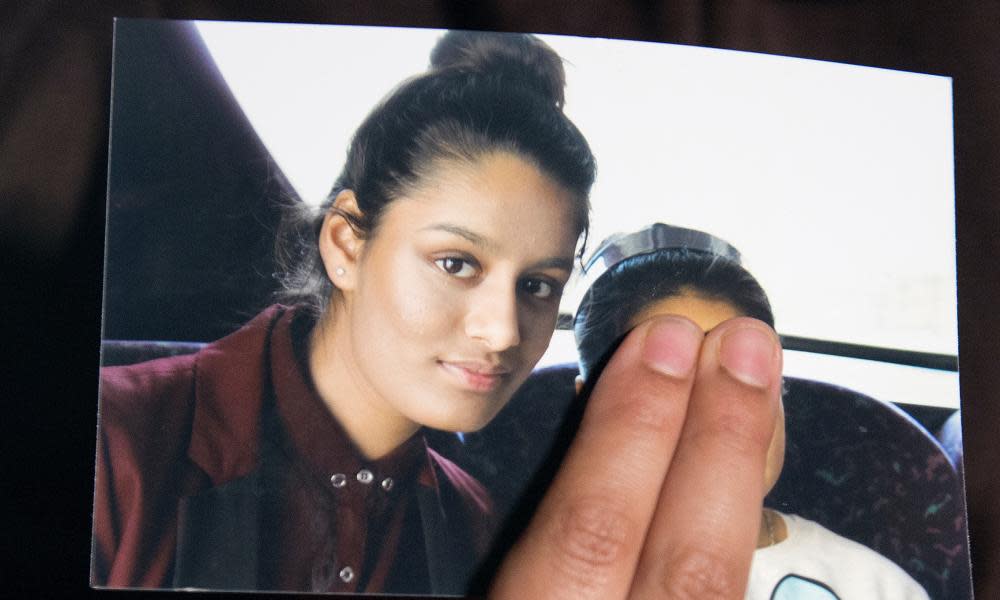Let Shamima Begum return to UK or risk more terror recruits, says expert

The home secretary’s response to teenage Islamic State bride Shamima Begum will guarantee new recruits to the ideology that underpins the terror group, a former senior counter-radicalisation expert for the government has warned.
As the debate over whether to allow Begum, who left the UK to join Islamic State as a 15-year-old, to return home continued on Saturday, Hanif Qadir said Sajid Javid’s reaction to the teenager’s predicament fed the narrative of Isis.
On Friday Javid said he “would not hesitate” to prevent the return of UK Isis recruits, an approach at odds with Begum’s family in Bethnal Green, east London, who want the 19-year-old to return home “as a matter of urgency”.
Qadir, a senior expert with the government’s counter-extremism Prevent programme and whose cases included raising the alarm about a group of schoolgirls who planned to join Isis in Syria, said: “Javid is fuelling the [Isis] narrative and giving wind to the sails of other extremists. If we continue with this trajectory we’ll be sowing the narrative for them to reap and use against us.”

Qadir, whose charity Active Change Foundation was supported by police and worked with high-profile extremists until 2016, said the home secretary’s emphatic response would backfire. “If the government doesn’t change their approach to this, we potentially have a second wave of Isis coming, the connecting up and reloading of Isis, fence-sitters who are more sympathetic to another kind of narrative,” he said.
This point was backed by Baroness Sal Brinton, president of the Lib Dems, who described Begum’s radicalisation as a form of grooming. “We know that in that particular school three girls went [to join Islamic State], but probably more were approached. Surely our child protection laws have to kick in. As she returns we should look at what happens, as she was 15, and what happened out there.”
Begum, 19, who is heavily pregnant, wants to return to the UK to raise her child but is worried that her baby will be taken from her if she does return from the refugee camp in Syria where she was found by the Times last week.
Although Begum is likely to be traumatised, Qadir said that if she received the right mentoring, counselling and passed through the necessary security protocols, she could be successfully rehabilitated.
The question of what approach to adopt towards Isis returnees following the near-total eradication of the terrorist group’s caliphate in Syria and Iraq is increasingly vexed, with France alone among the European countries in being proactive in preparing for their nationals’ return.
Few are convinced that the EU’s policing and security can be relied upon to pick up even the most dangerous individuals
The French government, hit with a series of devastaing Isis-inspired terror attacks, has been making contingency plans to prevent their nationals slipping the net in north-east Syria as the US withdraws.
In Brussels the focus has been on trying to raise standards in the swift sharing of information among EU member states, and its dissemination to border databases should there be an uncontrolled wave of returnees.
The EU’s security commissioner, Sir Julian King, has made repeated appeals for the capitals to prepare for the fallout from Isis’s military defeat. “Some 6,000 men and women left the EU to travel to the conflict zone – and around 1,500 children with one or more parent eligible for an EU passport have been taken there or were born there,” King said in a recent speech.
Yet along with the appeals of Gilles de Kerchove, the EU’s coordinator for the fight against terrorism, calls for improvements in the sharing of intelligence seem to have fallen on deaf ears. A series of de Kerchove’s reports have lamented the lack of progress in spreading the most up-to- date information between national authorities. Few are convinced that the EU’s security services can be relied upon for them to pick up even the most dangerous individuals. “They have dropped the ball, despite plenty of warning,” said Karin von Hippel, director-general of the Royal United Services Institute.
In the Netherlands the justice and security minister, Ferdinand Grapperhaus, recently braved the critics by revealing that the government was cooperating with local authorities in Syria for the return of women accused of Isis membership and their children. He made his comments after a Dutch citizen died in a displacement camp in northern Syria’s Ain al-Issa, leaving two children behind.
Yet the Netherlands, of which Begum’s husband, Yago Riedijk, 26, is a national, born into a middle-class family in an affluent suburb in Arnhem, otherwise retains a tough approach which is echoed elsewhere to foreign fighters. “Nobody, but really nobody, with the exception of France, wants them back,” said Rik Coolsaet, a professor of international relations at Ghent University
Closer to home, on the streets of Bethnal Green, many hope Begum will be allowed to return, among them Suhail Ahmed, manager of an Asian fashion store. He said: “Because she is a British citizen, she should be under the law [here]. It is bad what she did, but police can handle it. When she is older she will not think this way.”

 Yahoo Movies
Yahoo Movies 
